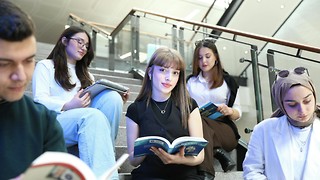Yerma shows signs of blooming
The Dryden Society’s rendition of Lorca’s timeless tragedy navigates societal expectations and unfulfilled desires against the backdrop of Trinity’s Nevile’s Court

It is brave to reimagine Federico García Lorca’s iconic ‘Yerma’; bolder yet to stage the production outdoors in March in Cambridge. Equipped with a new translation by Dylan Stewart and the cover of cloisters beneath the Wren library, this retelling masterfully conveys the despair and oppression of a woman suffocated by the societal and self-inflicted pressure to bear children. Yerma, which translates to ‘barren’, wrestles with ideas of infertility, passionless marriage and isolation - but this performance is certainly not sterile.
Against the backdrop of pre-civil war Spain, the play forms part of Lorca’s ‘Rural Trilogy’ depicting the harsh realities of rural life. Yerma follows the journey of a married woman grappling with infertility, whose relentless yearning for motherhood leads her towards tragedy.
As I took my seat, Rowold Cavusoglu’s set design whisked me away to southern Spain. A hand painted mural filled with vibrant imagery from the play - an apple, a bull, the Granada pomegranate - demonstrated meticulous attention to detail. The setting is well considered: the pillars of Trinity’s Nevile court allude to the Andalusian architecture, while the large window overlooking the river Cam that the protagonist gazes through is an apt reference to her entrapment within her house and the suffocating ideals of society, as well as her longing for fertility that Lorca symbolises through water. Whether intended or coincidental, the echoing chimes of the college clock striking on the hour aided the atmosphere of time passing in a play that spans five years.
“Miller’s presence on stage was commanding, her every movement imbued with a sense of longing”
The eponymous protagonist (Lucy Miller) is filled with despair and emptiness at her childless life. Miller’s presence on stage was commanding, her every movement imbued with a sense of longing and desperation as she took centre-stage for virtually the entirety of the play. There were some moments when the emotional depth required to fully engage the audience in Yerma’s plight felt just beyond reach: the climatic scene in which Yerma smothers her husband lacked the visceral impact it demanded. Miller’s performance was certainly powerful, but doesn’t quite manage to enlist our sympathy in the climatic ending as Yerma does in the original play. This final scene is a cry for freedom from the pain of being a woman in such a constrictive society defined by fertility. I couldn’t help but feel that this performance didn’t achieve the harrowing atmosphere it deserved, hindered by the anti-climatic blocking of the final scene. As she mourns the child she’s never met with the powerful line “I have killed my only child!”, the staging fell slightly flat.
But throughout the play, Miller does an excellent job of presenting the sexual tension between Yerma and Victor (Jay Palombella). Through coy gestures and longing gazes, their magnetism is palpable, conveying an unfulfilled lust that starkly contrasts the passionless marriage with Juan (Hector Day-Lunn) that Yerma remains so faithful to.
Day-Lunn’s portrayal brought a fast-paced energy and dynamism with explosive delivery and movement. In a role that is at once reinforcing the patriarchy while dismantling stereotypes of the nuclear family that are pushed forward by his wife and the rest of society, Day-Lunn navigates these complexities in an emphatic performance.
“The odd ‘hola’ or ‘buenos tardes’ would’ve gone a long way to remind us of the milieu”
The success of this play is largely owing to the impressive translation. Flowing and fast-paced, Stewart’s interpretation carried the weight of Lorca’s timeless themes. From Miller’s almost Shakespearean performance, to Hector’s portrayal of Juan reminiscent of a character plucked from a BBC drama, the script offered the actors abundant space to breathe new life into Lorca’s iconic characters while remaining faithful to the spirit of the original text. While the tone wasn’t necessarily consistent, it was strong throughout. Stylistic choices in translation were effective, as one line rang in my mind after the show: “Men have another life: cattle, trees, conversations. Women don’t have anything but children and childcare”. When spoken allowed, these words struck out with alliterative poignance.
The integration of Spanish language and Andalusian culture, while effective in the few instances it was used, felt somewhat lacking in the script. The decision to keep the original names created a dissonance as the audience was occasionally reminded of the setting without being fully transported there. Perhaps this was intentional by the translator to maintain relevance to the audience – but the odd ‘hola’ or ‘buenos tardes’ would’ve gone a long way to remind us of the milieu.
If we weren’t transported to Spain through the script, the music certainly brought a sense of Andalusian culture. Xavier Cooke’s guitar melodies and soulful flamenco rhythms created an atmospheric backdrop to the unfolding drama, underscoring the emotional depth of the characters and transporting the audience to the landscape of rural Spain.
The exploration of societal pressure, gossip and the stifling conformity of patriarchal village life could have been pushed further. In Lorca’s original work, gossip functions as the silent antagonist, lurking in the shadows and shaping the characters’ decisions and interactions. In this production, the pervasive influence of gossip and insidious nature of ‘el que dirán’ (the opinion of others) felt somewhat muted. While there were nods towards this theme - the use of masks to represent societal expectations, transforming the chorus into a faceless mass of judgement and scrutiny, or the characters filing through the audience at the end of the play - these moments felt fleeting, lacking the depth and impact needed to fully engage with the theme. The open nature of the setting, and the fact that we observe Yerma while passers-by walking through the court watch us observing her would’ve lent itself well to audience interaction and immersion.
This retelling is undoubtedly rich in symbolism. It captures the essence of Lorca’s vision of a ‘tragic poem’, cultivating the story of a woman troubled by her infertility, loveless marriage, and the pressure that led her to marry the wrong man in a society ruled by patriarchy and the rigid defence of honour.
 News / Local business in trademark battle with Uni over use of ‘Cambridge’17 January 2026
News / Local business in trademark battle with Uni over use of ‘Cambridge’17 January 2026 Comment / The (Dys)functions of student politics at Cambridge19 January 2026
Comment / The (Dys)functions of student politics at Cambridge19 January 2026 News / Cambridge bus strikes continue into new year16 January 2026
News / Cambridge bus strikes continue into new year16 January 2026 Comment / Fine, you’re more stressed than I am – you win?18 January 2026
Comment / Fine, you’re more stressed than I am – you win?18 January 2026 Features / Exploring Cambridge’s past, present, and future18 January 2026
Features / Exploring Cambridge’s past, present, and future18 January 2026









